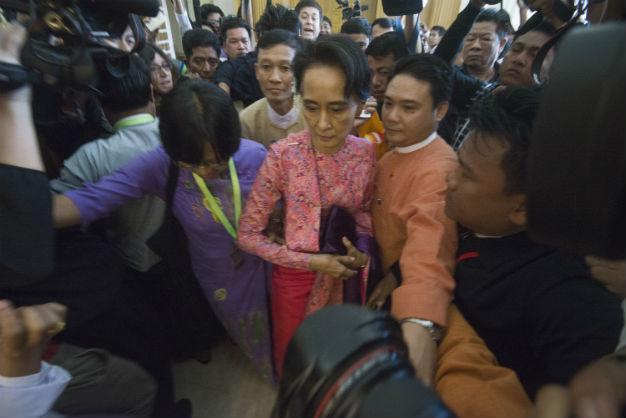New era dawns as Suu Kyi's party strides into Myanmar parliament
NAYPYIDAW, Myanmar - Agence France-Presse

AA photo
Myanmar entered a new political era Feb. 1 as Aung San Suu Kyi's pro-democracy MPs took their seats in parliament, carrying the hopes of a nation subjugated for decades by the military.
Wearing orange uniforms, lawmakers from Suu Kyi's National League for Democracy (NLD) arrived for their first day of work in the capital Naypyidaw buoyed by a massive popular mandate from November's election.
That poll saw the NLD wrest a majority from the army establishment and has spurred hopes of a new political dawn in the long repressed nation.
Suu Kyi, the figurehead of Myanmar's struggle for democracy, entered the cavernous parliament building without making a comment.
She took a seat alone for the short opening session which saw the lawmakers sworn in and the appointment of a close ally, Win Myint, as lower house speaker.
"Today is a day to be proud of in Myanmar's political history and for the democratic transition," Win Myint said in an acceptance speech.
The new government faces a daunting rebuilding task in one of Southeast Asia's poorest countries where the economy has been crushed by generations of junta rule.
Many NLD MPs are also political novices, unskilled in the business of government.
They will have to swiftly adapt to a treacly decision-making process in a legislature where unelected soldiers occupy 25 percent of all seats.
"It's a historic moment for the country," said Myanmar political analyst Khin Zaw Win said, adding "a lot of worries come as part of the package" of taking power.
Suu Kyi,70, is barred from being president by a military-scripted constitution because she married and had children with a foreigner.
She has vowed to sidestep this hurdle by ruling "above" a proxy president, although she has yet to reveal her choice for the role.
While there is no clear schedule for the selection of candidates, it could be within days.
Elected members of both houses and the military will nominate three candidates to succeed President Thein Sein, who retains his post until the end of March.
The new president will then be chosen by a vote of the combined houses.
Observers are closely watching Suu Kyi's relationship with the still powerful military, which holds key ministries as well as the 25 percent parliamentary bloc.
Suu Kyi may try to persuade the army to help her change the charter clause that blocks her path to power, analysts say, although it has so far baulked at any attempt to redraft it.
After decades under the military yoke, Myanmar's people queued in their thousands to cast ballots for Suu Kyi and her party in November, throwing their support behind her simple campaign message of "change".
With a resounding parliamentary majority, her lawmakers are -- at least initially -- expected to act as a rubber stamp for her government.
The country has begun to blossom since the end of outright army rule in 2011.
Thein Sein's quasi-civilian government has since opened the long-isolated country to international investment and launching sweeping political reforms.
But Myanmar remains blighted by civil wars and ethnic and religious divisions, while poverty rates are high and the country's bureaucracy is poorly funded and riven with corruption.
On the streets of Yangon, ordinary people said they were however optimistic about what Suu Kyi could achieve.
"We have been hoping for an NLD government for a long time. I feel happy now," said 22-year-old dentist Kyaw Htet.
